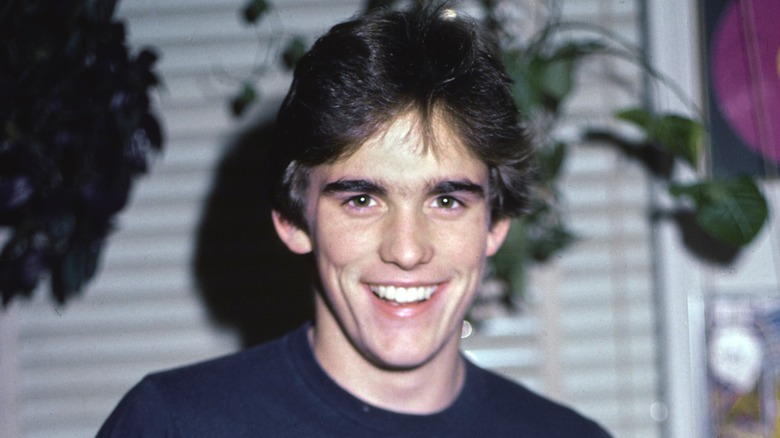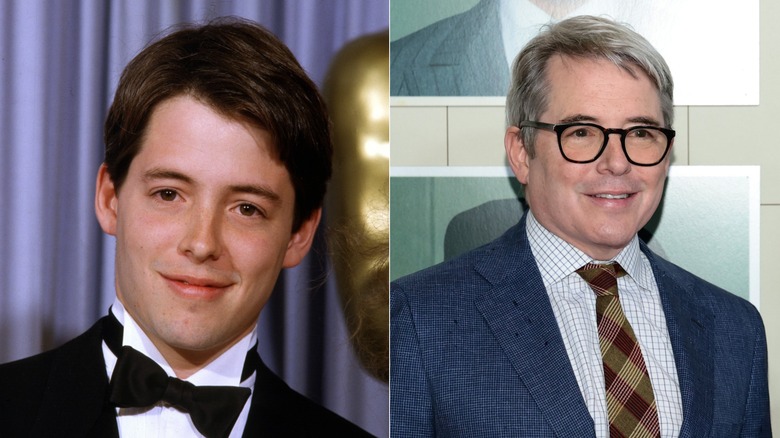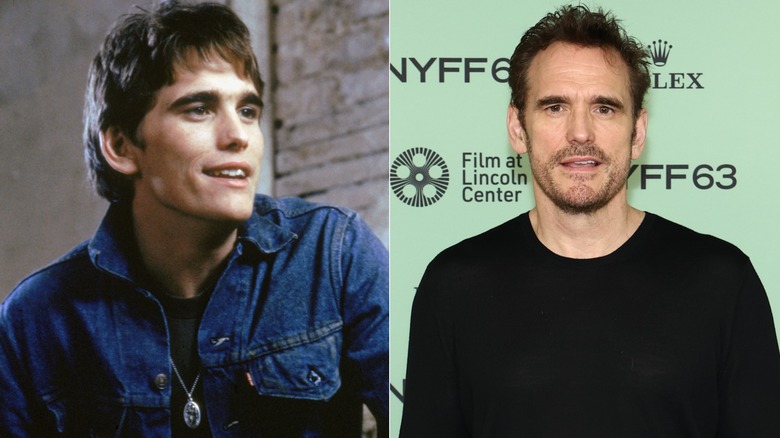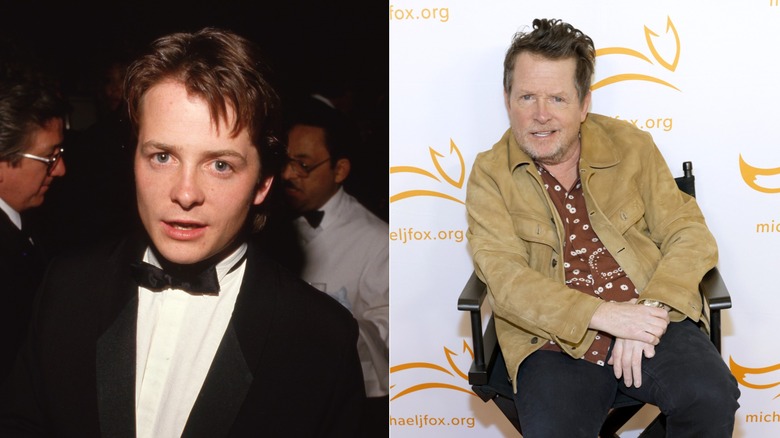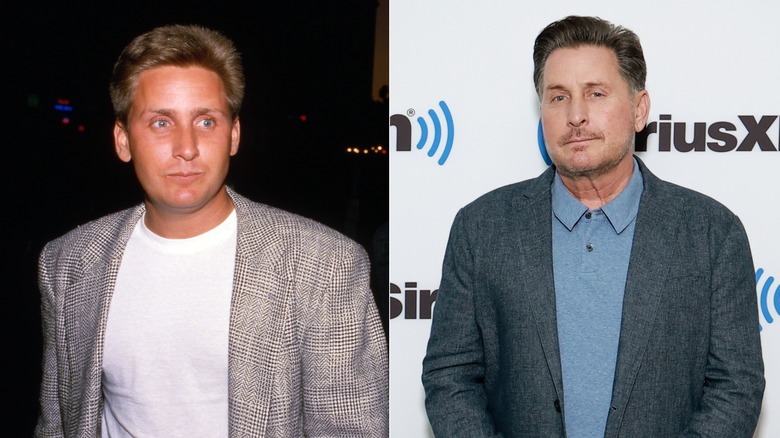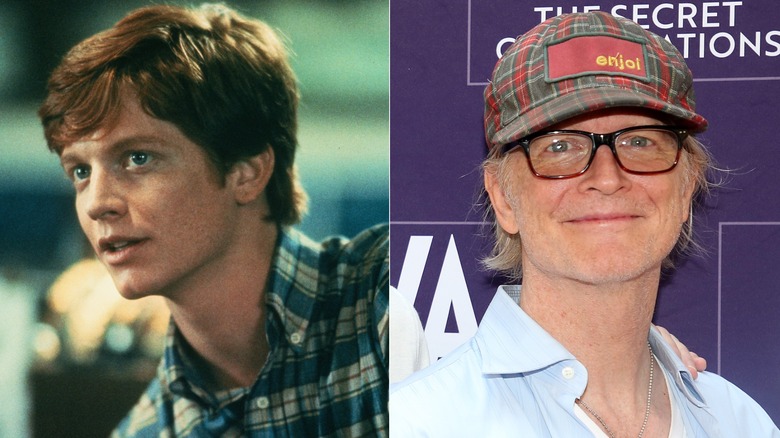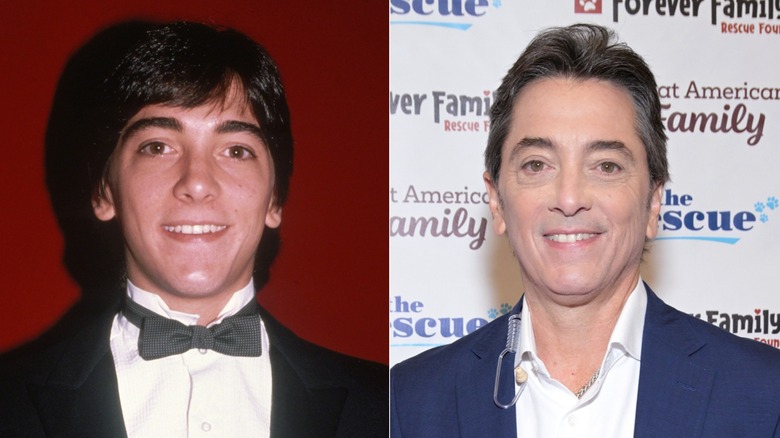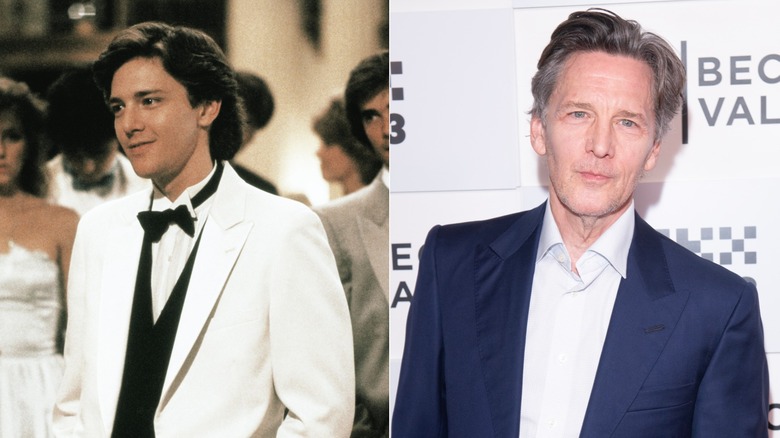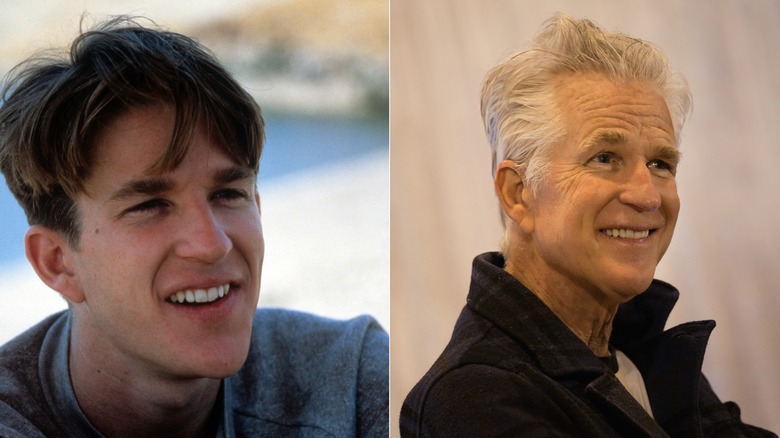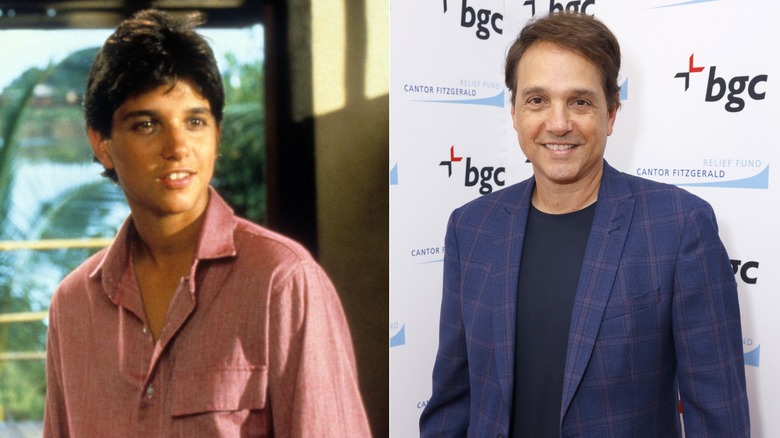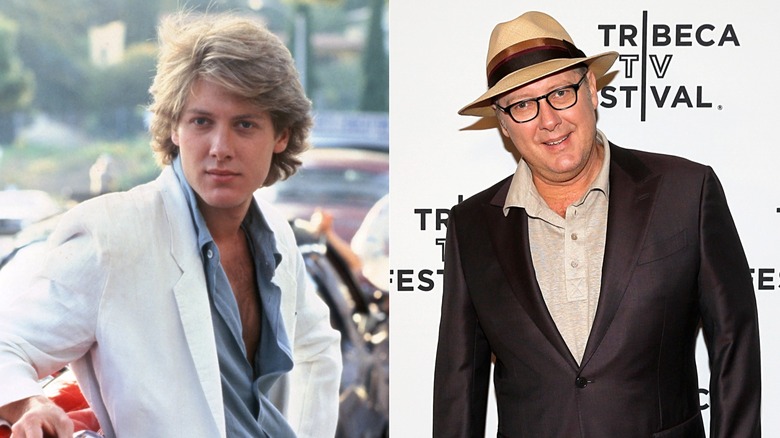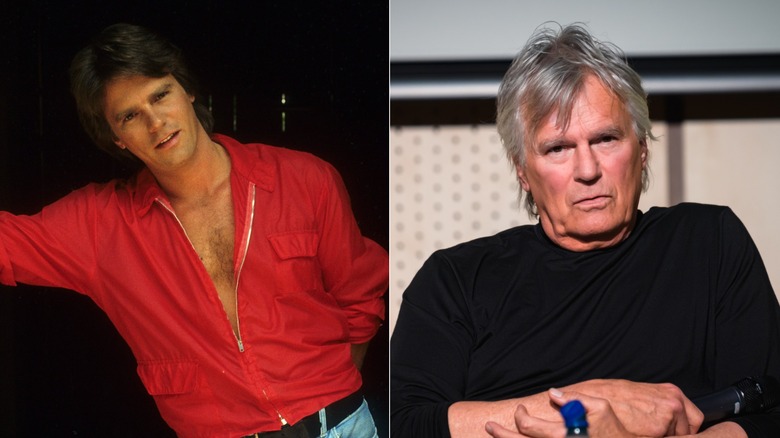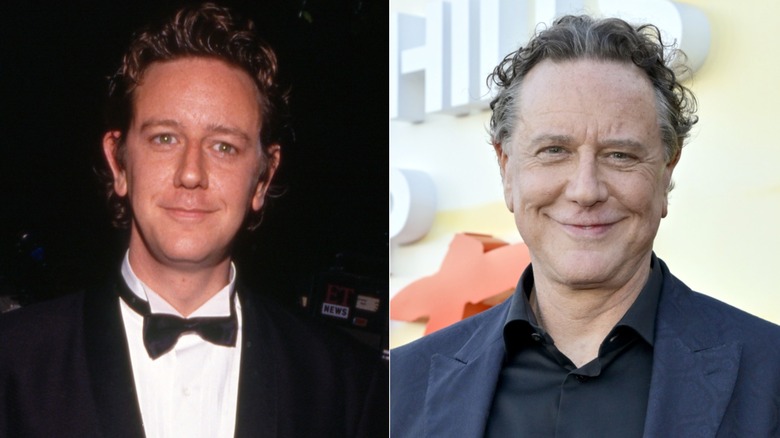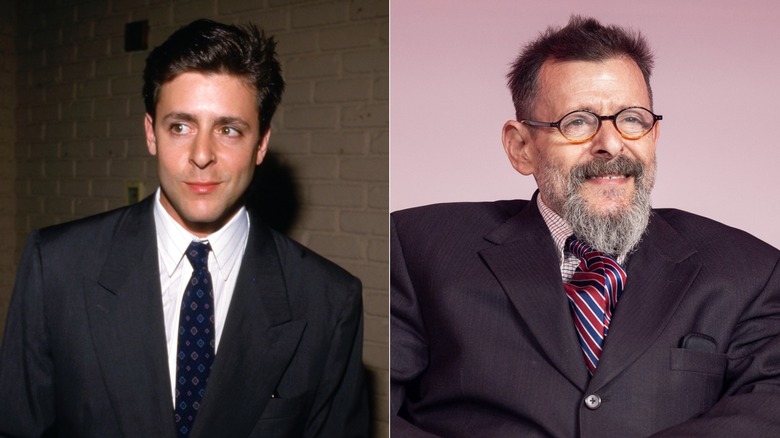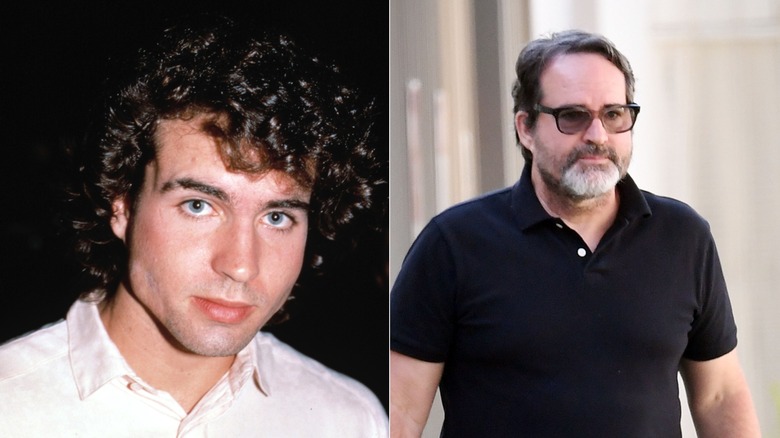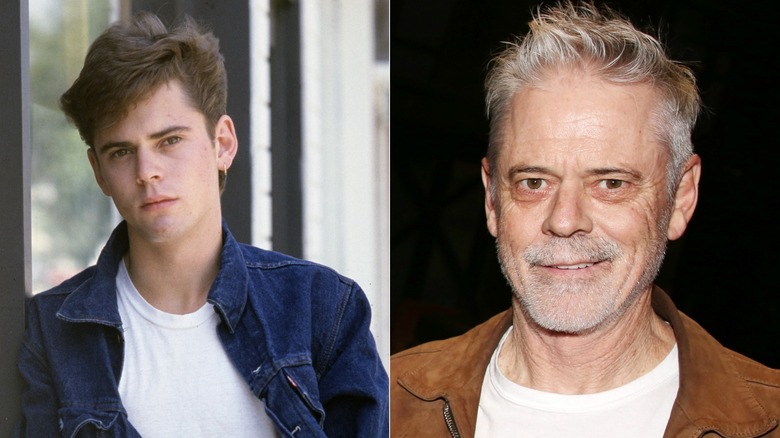'80s Heartthrobs You Won't Recognize Today
The 1980s were a golden period for movie crushes. With a spate of coming-of-age films and youth-targeted cinema defining the decade, audiences were presented with a whole new genre of idols they could aspire toward. Unlike the rugged, macho heroes who dominated screens in the years before — think: Clint Eastwood, Sylvester Stallone, and the like — the new wave of '80s heartthrobs brought with them a different kind of charm. They were softer around the edges and real in ways that made them relatable to masses growing up during that era.
It was a mixed club of perennially earnest stars like Ralph Macchio and Matthew Modine, as well as seemingly more brazenfaced boys like Judd Nelson, Emilio Estevez, and Andrew McCarthy — who were infamously grouped together as the Brat Pack. Together, they ushered in a cultural moment that reflected the ambitions of an entire millennial generation. Decades on, time has naturally reshaped those faces that were once splashed across magazine covers and film posters, but the nostalgia they carry hasn't faded. Here's a nostalgic blast from the past for those wondering what happened to the Brat Pack and other heartthrobs who defined '80s cinema.
Matthew Broderick
With his cheeky grin and boy-next-door appeal, Matthew Broderick charmed his way into the hearts of a whole generation in the '80s. He was already an established star of the stage and screen by the time his image-defining role in the 1986 teen film "Ferris Bueller's Day Off" rolled around, giving Broderick an identity that would stick for the rest of his lifetime. To fans of that era, Broderick and Ferris Bueller were two sides of the same coin: sweet-faced, endearing, and forever with a glint of mischief in his eyes.
Reconciling that image of a youthful Broderick with his now matured self, complete with silver hair and thick spectacles, hasn't been an easy feat for that audience — despite the fact that the star has practically aged before the camera, having consistently acted across formats since his peak in the '80s. Unlike many stars of his league who have tried to shake off their former glory in search of new horizons, Broderick has gracefully embraced his past. "What's my legacy? Well, I'm Ferris Bueller, I suppose," he told The Guardian in 2023. "I have to accept it. And I like it. I've made my peace with it."
Matt Dillon
Matt Dillon was a living, breathing personification of '80s angst. With films like "The Outsiders," "My Bodyguard," and "Tex" lining his film career, Dillon carried the mood of that era's youth on his effortlessly cool, plaid-shirted, leather-jacketed shoulders. The duality of his rugged handsomeness and deeply vulnerable persona also helped turn him into a universal crush very early in his career. Although many cinema cycles have passed since, and his fame has relatively waned, Dillon seems to have lost none of his relevance among fans.
Even with a changed appearance, his endlessly good looks continue to dazzle audiences — so much so that he has managed to capture a whole new, much younger fan base across social media. In fact, following viral TikTok videos about his ageless form, he addressed the surge of online attention coming his way at the 2025 Toronto International Film Festival, telling reporters: "I think the thing is just keep your spirit young. Enjoy life, make sure you get plenty of exercise" (via People).
Michael J. Fox
From "Family Ties" to "Back to the Future" and "Teen Wolf," Michael J. Fox headlined all that was cool in the '80s, with a good-natured charisma that people couldn't get enough of. Fame hit Fox young and fast, and by the time he entered his 20s, his stardom was soaring to incredible heights. "Literally, in three years, I go from being the kid stuffed in lockers to having a conversation with Steven Spielberg about doing his next movie," he told PBS News in 2023.
Marriage, children, a thriving career — Fox had it all in the '80s. When the decade turned, however, he received a diagnosis that stood to change his life: Parkinson's disease. For years, he kept his condition private, continuing to entertain on screen and defy the odds of his medical prognosis, which predicted that his acting career would be over within a decade. Fox's health issues didn't slow him down; if anything, he worked harder, expanding his oeuvre and using his platform to raise awareness about the disease.
Emilio Estevez
Charlie Sheen's brother Emilio Estevez held sway over an entire generation long before Sheen became pop culture currency. A key member of the crew of fresh-faced actors who ruled cinema screens as the Brat Pack — with quintessential youth films like "The Outsiders," "The Breakfast Club," and "St. Elmo's Fire" under his belt — Estevez personified a kind of rebellious cool that millions of young people during that era aspired toward. Even though his repertoire contrasted the filmographies of his brother and father, he carried the Sheen acting legacy forward by miles.
Notwithstanding the stellar work he did in the '80s and the fame he amassed, Estevez's renown eventually mellowed. "I've done some forgettable s**t too ... There's no avoiding it," he told Vanity Fair in 2021. Save for a recurring role in "The Mighty Ducks" franchise in the '90s, he retreated from the spotlight and shifted his focus behind the camera to film and television direction. In recent years, Estevez has kept a relatively low profile, with his older, wiser look far removed from the bad boy branding that defined his peak in the '80s.
Eric Stoltz
Few youth icons captured the pulse of '80s cinema as Eric Stoltz did. His flaming red hair, handsome looks, and immeasurable talent towed him through some classic films of the decade, from his magnum opus "Mask" to "Fast Times at Ridgemont High," "Some Kind of Wonderful," and "Say Anything." An unforgettable part of Stoltz's '80s lore is that he was also set to headline yet another blockbuster, "Back to the Future," which instead became the star-making vehicle for his contemporary, Michael J. Fox.
Even without the sci-fi landmark that slipped through his fingers, Stoltz carved out a tall showbiz legacy for himself. His pivot to television direction, with titles like "Glee" and "Madam Secretary," became a key part of his later career. "I would hope that being an actor has helped me in my directing, because one thing I try to do is I prioritize performance over technique," he told Yahoo Entertainment in 2018. In his 60s now, Stoltz doesn't look anything like his teen idol self, but the commitment to his craft, which made his '80s work so compelling, still shines through.
Scott Baio
Scott Baio hasn't really traced the smoothest of transitions from an '80s heartthrob to an occasional actor living in the shadow of his long-lost fame. Throughout the '80s, Baio had wide influence over sitcom audiences, who knew him as either Chachi Arcola from "Happy Days" or Charles from "Charles in Charge." He had impressive range that allowed him to effortlessly shift gears between the sweet, puppy-eyed, boy-next-door type and the jacket-clad youth icon who exuded inimitable levels of cool.
His golden run on the small screen continued well into the '90s, but as the millennium turned, so did Baio's legacy. He took on an increasingly controversial public image, marked by allegations of sexual misconduct and his conservative political leanings. On Bill O'Reilly's "No Spin Zone," Baio said that his decline in the industry was a consequence of vocalizing his support for Donald Trump: "I knew that I would probably be canceled, I knew that I would be an outcast ... and I was right."
Andrew McCarthy
Andrew McCarthy has far outgrown the boy-next-door charm that endeared him to audiences in the '80s. Despite the graying look and matured appearance he now sports as an established travel writer, that perpetual twinkle in his eye is a dead giveaway of who he is. The star of classic coming-of-age films like "Class," "Pretty in Pink," "St. Elmo's Fire," and "Less Than Zero," McCarthy was a core member of the fabled Brat Pack, albeit one of its less notorious ones. In films dominated by loud rebels and womanizing heartbreakers, McCarthy was always the thoughtful dreamer, the shy romantic, the underdog everyone rooted for.
Given the kind of characters he played, McCarthy enjoyed a nice guy image for much of this era. Even so, he was open about his dislike for the Brat Pack label, which stuck throughout his acting career. A public reckoning of sorts happened when things came full circle and McCarthy confronted his contentious bratty identity head-on, first in an autobiography and then with his 2024 documentary "Brats," which he wrote and directed. The documentary reunited his '80s crew for a trip down memory lane and a long-overdue discussion with the writer behind the now-iconic Brat Pack title.
Matthew Modine
In the '80s, Matthew Modine embodied a kind of charm that didn't shout for attention. And yet, the young star of critically acclaimed films like "Birdy," "Vision Quest," "Full Metal Jacket," and "Married to the Mob" amassed such wide adulation that he stood miles ahead from his contemporaries. It wasn't just Modine's good looks that made him such a hit early in his career; the profound, vulnerable characters he opted for struck a chord with audiences who were apparently happy to trade the high-gloss, flashy heroism of the decade for something a little more real.
His golden run at the films continued for years, with Modine eventually trying his hand at writing, direction, and production. While many of his peers faded into nostalgia, he managed to stay relevant, backed by the mantra of prioritizing quality work over other superficial aspects of celebrity. "When you're young, you can get by on charm and looks, so you simply must continue to develop your skills as a performer," he told The Guardian in 2024. From "The Dark Knight Rises" to "Oppenheimer," Modine has appeared in some major blockbuster projects, albeit in an older but still recognizably suave avatar.
Ralph Macchio
With the success of 1984's "The Karate Kid," Ralph Macchio became the face of an entire underdog generation. His wide-eyed sincerity as Daniel LaRusso made him instantly relatable to millions, who saw in him an everyman star that stood apart from other hot-blooded heroes of that era. He went on to reprise his role throughout that decade, establishing himself as a true-blue '80s heartthrob. The truth about Macchio is that once the cameras stopped rolling, he came out on the other side as humble as the characters he portrayed, which helped sustain his beloved status.
In fact, The Guardian once dubbed him "famously one of the nicest people ever to appear on screen," with Macchio telling the publication, "I wasn't the biggest risk taker ... But also, maybe my caution helped me to stay grounded, so I'm at peace with the choices I made." Unlike many of his contemporaries who have eschewed their bygone '80s status, Macchio has happily continued to associate himself with his past work, indulging in spinoffs and modern adaptations of "The Karate Kid." He sports an older look now, but it is easy to recognize him from the eternally earnest smile on his face.
James Spader
James Spader has ruled television screens for the past few decades, with younger generations recognizing him as the sharp-witted Alan Shore on "Boston Legal" or the brilliant Raymond Reddington on "The Blacklist." But long before Spader turned the corner to find his calling in television, he enjoyed a phase as the ultimate brooding bad boy of '80s cinema, with teen favorite films like "Pretty in Pink" and "Less Than Zero" establishing him as a beloved youth figure. His piercing stare, suave style, and golden locks became signatures of his public image and attracted a massive fan base early on in his career.
His dreamboat looks, however, did not undercut his superior acting skills, allowing Spader to maintain a stronghold among both massy and niche audiences through the years. Case in point: "Sex, Lies, and Videotape," a landmark film starring Spader that was significant for pushing independent cinema forward. While the glory days of many of his fellow stars are contained largely within the '80s, Spader emerged as a rare screen icon who gained credibility beyond his heartthrob status and became one of those elite showbiz fixtures that audiences love to watch in just about anything.
Richard Dean Anderson
The name Richard Dean Anderson will probably conjure up the same image in the heads of people who belong to the '80s: a dashing, quick-thinking, benevolent guy in a leather jacket who can solve the most impossible of crimes with little more than brains and tact. That was Angus MacGyver, a character which embodied an older, masculine charm that diverged from the usual crop of younger teen idols symbolic of the era. Although Anderson dabbled in film, television remained his home base, where he bowled over audiences with one landmark role after another for years — most memorably, perhaps, as Jack O'Neill in the "Stargate" series.
Post-2010s, Anderson's work visibly slowed, and by 2013, he bowed out completely to lead a quieter, domestic life away from the blinding lights of showbiz. Sightings of Anderson became increasingly rare, save for some fan conventions around the world where Anderson, now white-haired and nearly unrecognizable, still pops up. Acting, meanwhile, seems to be a bygone chapter in Anderson's life. "He still gets offered guest spots on different shows ... but nothing has piqued his interest enough to get him to sign on," a source told Closer Weekly.
Judge Reinhold
Judge Reinhold was never the poster boy of quintessential '80s rebellion, nor the brooding romantic lead, but his everyman charm won over wide audiences during that era. He hit the ground running with "Stripes" early in the decade, establishing himself as a budding actor with potential after just his second film. Popular titles like "Fast Times at Ridgemont High," "Beverly Hills Cop," and "Ruthless People" further decorated his '80s career, which was largely defined by funny, ingenuous characters people loved to root for.
Even though his appeal as a youth star eventually waned, Reinhold managed to tap into a new demographic with films like "Beethoven" and "The Santa Clause" franchise. His new-age acting legacy remained overshadowed by the stellar work he did in the '80s, but much to the delight of his older millennial fans, he continued making appearances across film and television — often drawn to comedy projects that punned on his unique name, such as "Fanboys" and "Arrested Development."
Judd Nelson
Judd Nelson was the original bad boy of the '80s, having earned his distinct reputation in an era of sweet-faced heroes thanks to the 1985 coming-of-age classic "The Breakfast Club," which he starred in alongside the stunning Molly Ringwald. Nelson played troubled teenager John Bender who, despite terrorizing the group of wayward high school kids who spent an unforgettable detention day in the film, managed to strike a chord with audiences for his layered character. The scene where he lit up a match with his shoe remains burned into millennial memory.
Nelson kept the temper of his public image as a bold but reflective youth icon going through the decade, with other milestones like "St. Elmo's Fire," "Blue City," and "Billionaire Boys Club." He kept collecting acting credits into the millennium, slowing down only post the 2010s, when he engaged himself in other pursuits like writing. Today, the cast of "The Breakfast Club" look nearly unrecognizable. Although he never left the spotlight, Nelson's drastically changed appearance with stern glasses and a full French beard give him a rather distinguished look that vividly contrasts his '80s rebel image and strikes audiences every time they see him.
Jason Patric
When Jason Patric (aka John Anthony Miller III) burst onto the scene in the '80s, audiences were hardly surprised at his talent. He came from a lineage of screen and stage legends that included the likes of Jason and Linda Miller — both of whom were his parents, by the way. "The Lost Boys" was only Patric's third film, but his role as vampire-hunter Michael Emerson in the 1987 horror classic was so impactful that it put him on the Hollywood map immediately.
Patric was the living, breathing image of a quintessential '80s heartthrob — with his brooding charm, golden blowout, effortless cool (complete with a leather jacket), and matinee idol looks. It was no wonder he became an instant hit with audiences. Even so, Patric didn't linger longer than necessary in his teen icon bubble and broke out of it soon enough to explore a range of other genres, from crime dramas like "Rush" and "Sleepers" to neo-noir thrillers like "Narc." As Patric's roles evolved, so did he, going from a boyish '80s dreamboat to a versatile actor whose mature (yet still attractive) appearance reflects a career well lived.
C. Thomas Howell
C. Thomas Howell didn't just break out in the '80s — he thrived. He hit the ground running with a smashing debut in Steven Spielberg's history-making "E.T. the Extra-Terrestrial" in 1982, following it up with lead roles in a bunch of youth classics. "The Outsiders" was especially momentous for giving cinema some of its hottest up-and-coming actors, with an ensemble that included the likes of Rob Lowe, Patrick Swayze, Matt Dillon, Tom Cruise, Ralph Macchio, and, of course, Howell.
True to his character's timeless legacy, Howell shone gold as Ponyboy and carried his acting chops over to films like "Grandview, U.S.A." and "Red Dawn" — both of which also starred his close friend Swayze. While Howell's subsequent renown couldn't match up to his dramatic '80s fame, the vast body of work he amassed stood as proof of his love for the craft. Still a working actor, he told MovieWeb in 2024: "I'm almost 58 now and have wrinkles and gray hair, and the parts have changed, but I haven't lost my passion."
